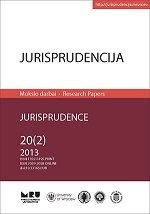The Concept of National Minorities in Turkey is Compulsive Obstacle or the Membership of Turkey in European Union?
The Concept of National Minorities in Turkey is Compulsive Obstacle or the Membership of Turkey in European Union?
Author(s): Arndt KünneckeSubject(s): Law, Constitution, Jurisprudence
Published by: Mykolas Romeris University
Keywords: Concept of Minorities; Minority Rights; EU; Turkey; Copenhagen Criteria
Summary/Abstract: Fifty years ago, on 12 September, 1963, the association agreement between the European Economic Community (EEC) and Turkey was signed in Ankara. However, in contrast to many other countries who applied later on, Turkey has not yet become a member of the EU. Nevertheless, Turkey’s candidacy to join the EU is still one of the most considerable and controversial topics within the European political arena. Within the accession negotiations, apart from human rights and the Kurdish and the Cypriot issues, one of the greatest challenges to Turkey’s successful candidacy is the issue of respect for and protection of minorities. It might indeed represent an unsolvable problem, which will ultimately block Turkey joining the EU. Neither the EU nor Turkey has really come to terms or dealt with what the EU sees as an “unsatisfactory” protection of minorities in Turkey. What lies at the root of this disagreement is what the term “minority” actually means. Due to Turkey’s own nation state concept as being a united and undivided country and to the terms of the Treaty of Lausanne signed in 1923, which defined Turkey as a nation, the country only recognises non-Muslim minorities. Moreover, contrary to the wording of the minority protection clauses in the Treaty of Lausanne, Turkey restricts its recognition of non-Muslim minorities only to the Greek, Armenian and Jewish religious populations. Although being a non-Muslim group as well, the Assyrians are excluded from the Turkish concept of minorities and, therefore, also from minority protection. In contrast to that, the EU’s concept of minority includes ethnic, linguistic and religious minorities, which means that according to the EU’s concept of minorities, also ethnic minorities like the Kurds, linguistic minorities like the Laz and religious minorities like the Alevis are included in the term “minority” and, therefore, these minorities should benefit from specific minority protection rights. To find a common basis for discussing the unsatisfactory issue of minority rights in Turkey, the concept of “ethnic groups” is introduced by the author as the most promising approach to deal with this unreconciled conceptual difference. According to this concept, ethnic groups could form a sub-identity of Turkishness and help build a legal basis to the treatment of minority groups founded on human rights, which would be compatible with both Turkish and EU Law.
Journal: Jurisprudencija
- Issue Year: 20/2013
- Issue No: 2
- Page Range: 527-547
- Page Count: 21
- Language: English

